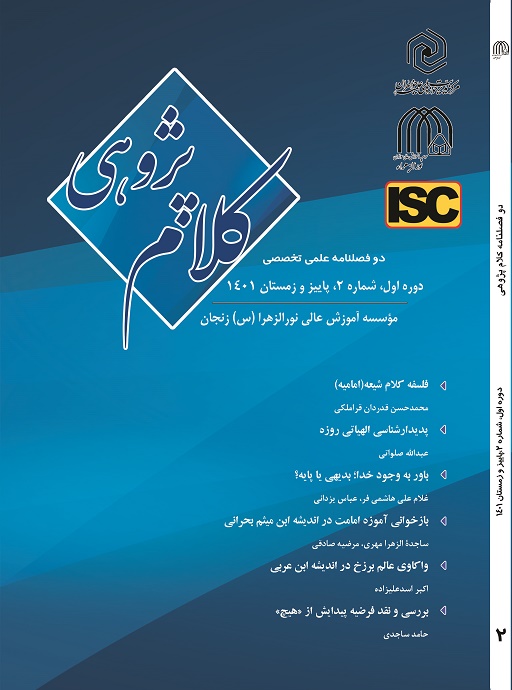نوع مقاله : مقاله پژوهشی
نویسنده
عضو هیئت علمی گروه کلام و فلسفه دین موسسه آموزشی و پژوهشی امام خمینی
چکیده
برای احیای نقش دین در زمینه علوم و مقابله با علوم سکولار برخی از اندیشمندان مسلمان، بر اسلامیسازی علوم تأکید دارند. بر این اساس، بررسی و انتخاب متقنترین نظریه در زمینۀ یادشده ضرورت دارد. محمد عماره نومعتزلی و آیتالله مصباح برای اسلامیسازی علوم نظریاتی را مطرح کردهاند. در این پژوهش، با روش توصیفی و تحلیلی با تمرکز بر آثار این دو شخصیت به بررسی تطبیقی و انتقادی آرای آنها در زمینه پیشگفته میپردازیم. تقسیم علوم به علوم خنثی و علوم دارای قابلیت دینی شدن و اسلامیسازی علوم قسم دوم در پرتو اسلامیسازی مبانی معرفتشناختی، هستیشناختی، انسانشناختی، دینشناختی و ارزششناختی آنها و اسلامیسازی بخش کاربردی علوم از مشترکات دیدگاه این دو اندیشمند است. از نقاط افتراق آرای این دو متفکر میتوان به مواردی مانند باور آیتالله مصباح به منبع بودن سنت اهلبیت (علیهمالسلام) برای اسلامیسازی علوم و عدم باور عماره به آن و دیدگاه آیتالله مصباح درباره خنثی بودن بخش توصیفی علومانسانی نسبت به اسلامیسازی و خنثی نبودن آن از دیدگاه عماره است. موجه نبودن دیدگاه آیتالله مصباح و عماره در زمینه خنثی بودن علوم طبیعی نسبت به اسلامیسازی از دیگر نتایج این پژوهش است.
کلیدواژهها
عنوان مقاله [English]
A comparative and critical review of the views of Amara Nomutzali and Ayatollah Misbah regarding the Islamization of sciences
نویسنده [English]
- javad goli
Member of the Faculty of Theology and Philosophy of Religion Department of Imam Khomeini Educational and Research Institute
چکیده [English]
In order to revive the role of religion in the field of science and confront secular science, some Muslim thinkers emphasize the Islamization of science. Based on this, it is necessary to examine and choose the most valid theory in the mentioned field. Mohammad Amara Nomutzali and Ayatollah Misbah have proposed theoretical sciences for Islamization. In this research, with a descriptive and analytical method, focusing on the works of these two personalities, we will do a comparative and critical examination of their opinions in the aforementioned field. Dividing sciences into neutral sciences and sciences with the ability to become religious and Islamicizing the sciences of the second part in the light of Islamizing their epistemological, ontological, anthropological, theological and value-based foundations and Islamizing the applied part of science is one of the common points of view of these two thinkers. Among the points of difference between these two thinkers are things like Ayatollah Misbah's belief that the Sunnah of Ahl al-Bayt (peace be upon him) is a source for the Islamization of sciences, and Amara's disbelief in it, and Ayatollah Misbah's view on the neutrality of the descriptive part of the human sciences with regard to Islamization and its non-neutrality from the point of view of It is a building. Another result of this research is that Ayatollah Mesbah and Amara's view on the neutrality of natural sciences towards Islamization is not justified.
کلیدواژهها [English]
- Science
- religion
- Islamization
- Misbah
- Amara

